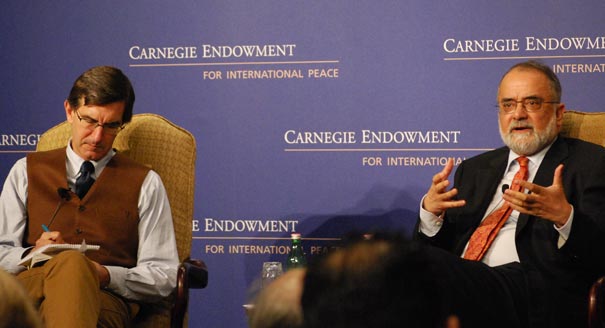Registration
Thank you!
You will receive an email confirming your registration.
As the United States prepares to withdraw combat troops from Afghanistan by 2014, many questions about the state of the U.S relationship with Afghanistan and Pakistan remain unanswered. In his new book, Pakistan on the Brink, best-selling author Ahmed Rashid outlines America’s options with Pakistan and Afghanistan in the post-Bin Laden years. Speaking at Carnegie, Rashid discussed these options, how to mend the strained Pakistani-U.S. relationship, and the future of the region. Carnegie’s George Perkovich moderated.
Changing Pakistan’s Narrative
- Pakistan’s Counterproductive Foreign Policy: Rashid explained that Pakistan depends on a protector for funds, but also refuses to reform economically. At the same time, Pakistan protects extremists to be the “front arm” of its foreign policy. Instead of taking advantage of its geostrategic location, it remains a hub of state conflict on two sides. Pakistan has not adapted or changed its policy since the Cold War.
- Paradoxical Relationship with Washington: Rashid blamed both the United States and Pakistan for the deterioration in bilateral relations. He cited a number of destabilizing incidents, including the U.S. raid that killed Osama bin Laden. Pakistan has grown increasingly anti-American, he added, but at the same time it still depends on U.S. aid.
- Changing Priorities: Pakistan has been become a state that prioritizes the military’s definition of national security at the expense of economic development, Rashid said. He criticized the Pakistani elite for neglecting development and their responsibility to help provide a good life for the people of Pakistan. Rashid argued that Pakistan must change its foreign policy. However, the military retains control over this domain and resists change. The public is increasingly dissatisfied with the direction of the country and the costs of the foreign policy the military has imposed, but this dissatisfaction has not yet led to the formation of organized groups or parties that can bring about structural change.
Restoring Bilateral Relations
- Military to Military Dialogue: Any major steps forward in the U.S.-Pakistan relationship will depend on the two countries’ militaries, which are the most powerful players in each systems, Rashid said. The militaries should institute direct talks to resolve current deadlocks and establish confidence building measures to improve relations.
- Dialogue with the Taliban: Rashid argued that the United States and Pakistan can find a common agenda in negotiations with the Taliban. Current U.S. negotiations have essentially bypassed Pakistan, fueling distrust on both sides, he explained. However, the United States needs access to leading Taliban figures, most of whom are residing in Pakistan. Given this common interest, both countries could benefit from cooperating much more on negotiations with the Taliban, Rashid concluded.
“Three Circles of Crises” on Afghanistan
- International Crisis: The Europeans are fed up with the war in Afghanistan, Rashid explained. Not only do they no longer have the financial capacity to fight this war, but he argued that they are deeply dissatisfied by the Obama administration unilateral decisions on Afghanistan.
- Regional Crisis: The region is in total turmoil, Rashid said. There has been a breakdown of Afghan relations with Pakistan and Iran, as well as rising tensions with Russia and Central Asian nations. But Rashid argued that there is still time to address these tensions, primarily by bringing the issue of a regional settlement into the discussion. Rashid added that the role Iran might play in such a discussion is likely to be dependent on the upcoming nuclear talks.
- Disarray in Kabul: There is no internal consensus in Afghanistan on talks with the Taliban. The Northern Alliance loathes Afghani President Karzai and is not prepared to support him on future peace talks. Most significantly, Rashid warned, the economy is in shambles. Afghanistan lacks any indigenous economy, and the thousands of Afghans who work for foreign troops will be rendered jobless and resentful when the West withdraws. The Afghan military forces are not prepared for this type of collapse, he added.
- A U.S Political Strategy: Due to these three crisis circles, Rashid argued, the most important thing Washington needs to understand is how to reduce the level of violence in Afghanistan emanating from both fighting forces. He recommended a piecemeal approach in which the U.S.-led forces and the Taliban reduce violence tit-for-tat at a district-by-district level to build mutual confidence. For example, as NATO night-raids are eliminated in one area, NATO would expect to verify the cessation of IED use or other Taliban violence in the same area. The main U.S. objective should be to ensure that the withdrawal of troops will not result in a civil war between President Karzai and the Taliban, or President Karzai and the Northern Alliance. Otherwise, Rashid warned that Afghanistan could collapse within a year.
